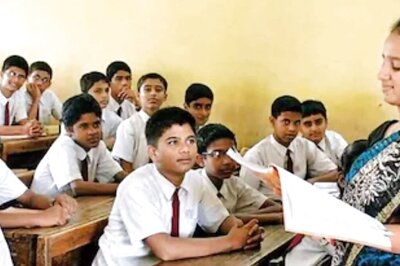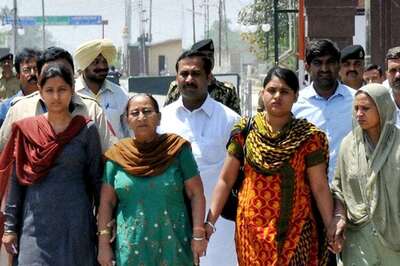
views
Congress leader Rahul Gandhi was on Thursday sentenced to two years in jail by a Surat court in a 2019 criminal defamation case over his “Modi surname” remark, in a setback to the Lok Sabha MP who faces the risk of disqualification. LIVE Updates
The court of Chief Judicial Magistrate HH Varma, which held 52-year-old Gandhi guilty under Indian Penal Code(IPC) sections 499 and 500, also granted him bail and suspended the sentence for 30 days to allow him to appeal in a higher court. Read what sections 499 and 500 are
Gandhi could have limited his speech to Prime Minister Narendra Modi, Nirav Modi, Vijay Mallya, Mehul Choksi, but he “intentionally” made a statement that hurt individuals carrying the Modi surname, and thereby committed criminal defamation, the court said in its 168-page order. Gandhi was present in the court when the verdict was pronounced.
What Did the Court Order Say?
In its order, the court noted that the seriousness of the accused’s crime increased because a speech delivered by a member of parliament has a “very wide impact on the public.” “And if the accused is given less punishment, then it sends a wrong message to the public and the purpose of defamation is not fulfilled and anybody will easily slander someone.” The court also said the Supreme Court had in the past asked the accused to remain alert in the future after he apologised in a 2018 case for his `chowkidar chor hai’ remark.
“Despite the Supreme Court alerting the accused, there appears to be no change in his conduct.” The defamation case was filed against Gandhi for his alleged remarks “How come all the thieves have Modi as the common surname?” on a complaint lodged by BJP MLA and former Gujarat minister Purnesh Modi.
The MP from Wayanad in Kerala had made the remarks while addressing a rally at Kolar in Karnataka on April 13, 2019 during the Lok Sabha poll campaign. Purnesh Modi welcomed the verdict. During the hearing on the quantum of sentence, Gandhi, when asked about the punishment, submitted before the court that he had delivered the speech as per his duty in the interest of the public. The Congress leader also submitted that he has no discrimination against anybody and loves and cherishes all the people of his country.
Gandhi’s lawyer argued for a lesser punishment claiming there was no intention to insult anyone. Gandhi returned from Surat to the national capital in the evening and was accorded a reception at the domestic airport in Delhi on his arrival.
What About His MP Status?
Gandhi can escape immediate disqualification as a member of parliament if the appellate court suspends the conviction as well as the two-year jail term. As the conviction ahead of the 2024 Lok Sabha elections set off a political slugfest and posed another challenge to Gandhi with a bearing on his political future, the Congress said he will file an appeal.
According to the Representation of the People Act, a person sentenced to imprisonment of two years or more shall be disqualified “from the date of such conviction” and remain disqualified for another six years after serving time. P D T Achari, a former Lok Sabha Secretary General and Constitution expert, told PTI if the appellate court stays the conviction and the sentence then the disqualification will remain suspended.
#WATCH | Congress MP Rahul Gandhi returned to Delhi earlier this evening. Surat District Court held him guilty in the criminal defamation case filed against him over his 'Modi surname' remark. He was later granted bail.
(Video Source: Congress) pic.twitter.com/i0CRbTtyLy
— ANI (@ANI) March 23, 2023
“The disqualification will last for eight years (in case he is disqualified),” he said, adding that a disqualified person can neither contest, poll or vote for a certain period.
Sources told PTI that after going through the judgment, the Lok Sabha Secretariat will take a call on issuing a notification announcing a vacancy in the lower house. Parliamentary Affairs minister Pralhad Joshi said legal experts will examine the verdict and only after that the government will take a decision on the next step.
What are the Legal Remedies Available to Gandhi?
According to an India Today report, the decision of conviction can be contested before a higher court where the appeal sits within the legal system outlined in the Code of Criminal Procedure (CrPC).
Section 374 of the CrPC allows for appeals from conviction. Rahul Gandhi can so appeal the conviction and sentence to the Sessions Court.
If the Sessions Court does not award relief, the next legal option is to file an appeal with a higher court. If no redress is provided, the Sessions Court order might be challenged in the High Court.
While these matters are pending in the courts, he can seek interim relief in the form of an interim stay of his sentence and bail, says the report.
Along with his appeal, Rahul Gandhi will have to file an application under Section 389 of the CrPC seeking suspension of sentence and conviction.
Section 389 allows the punishment to be suspended pending the appeal and the appellant to be released on bail.
It specifies that while a condemned individual is appealing, the Appellate Court may order that the execution of the sentence or order appealed against be suspended, the report explains.
#WATCH | Delhi: Rahul Gandhi attends the meeting of Congress MPs at the Congress Parliamentary Office in Parliament. Party chief and LoP in Rajya Sabha, Mallikarjun Kharge & UPA chairperson Sonia Gandhi also present.
(Video Source: AICC) pic.twitter.com/oyxj3YwPno
— ANI (@ANI) March 24, 2023
Gandhi may also petition the Supreme Court under Article 136 of the Constitution. The Supreme Court has broad appellate authority over all courts and tribunals in India under Article 136. The Supreme Court may grant special permission to appeal under Article 136 of the Constitution from any judgement, decision, determination, sentence, or order passed or made by any Court or Tribunal in India’s territory.
Remedies Against Disqualification
A disqualification of an MP convicted of an offence can occur in two ways. First, it must be determined if the crime for which he was condemned is listed in Section 8(1) of the Representation of the People Act of 1951. This covers particular offences like inciting animosity between two groups, bribery, and undue influence or personation during an election. Defamation is not included on this list, explains a report by Indian Express.
Second, if the legislator is convicted of any other crime but sentenced to two years or more in prison. According to Section 8(3) of the RPA, an MP can be disqualified if convicted and sentenced to no less than two years in prison.
Clause 8(4) additionally says that the disqualification takes effect “three months from the date of conviction.” Gandhi has 30 days to file an appeal against the sentence with the High Court.
However, while the law formerly provided for a stay of disqualification if an appeal against the conviction was filed with a higher court, in the historic 2013 judgement in ‘Lily Thomas v Union of India,’ the Supreme Court declared Section 8(4) of the RPA unconstitutional, the report says, adding that this means that simply filing an appeal will not suffice; instead, the convicted MP must get a particular order of stay against the trial court’s conviction.
With inputs from PTI
Read all the Latest Explainers here




















Comments
0 comment